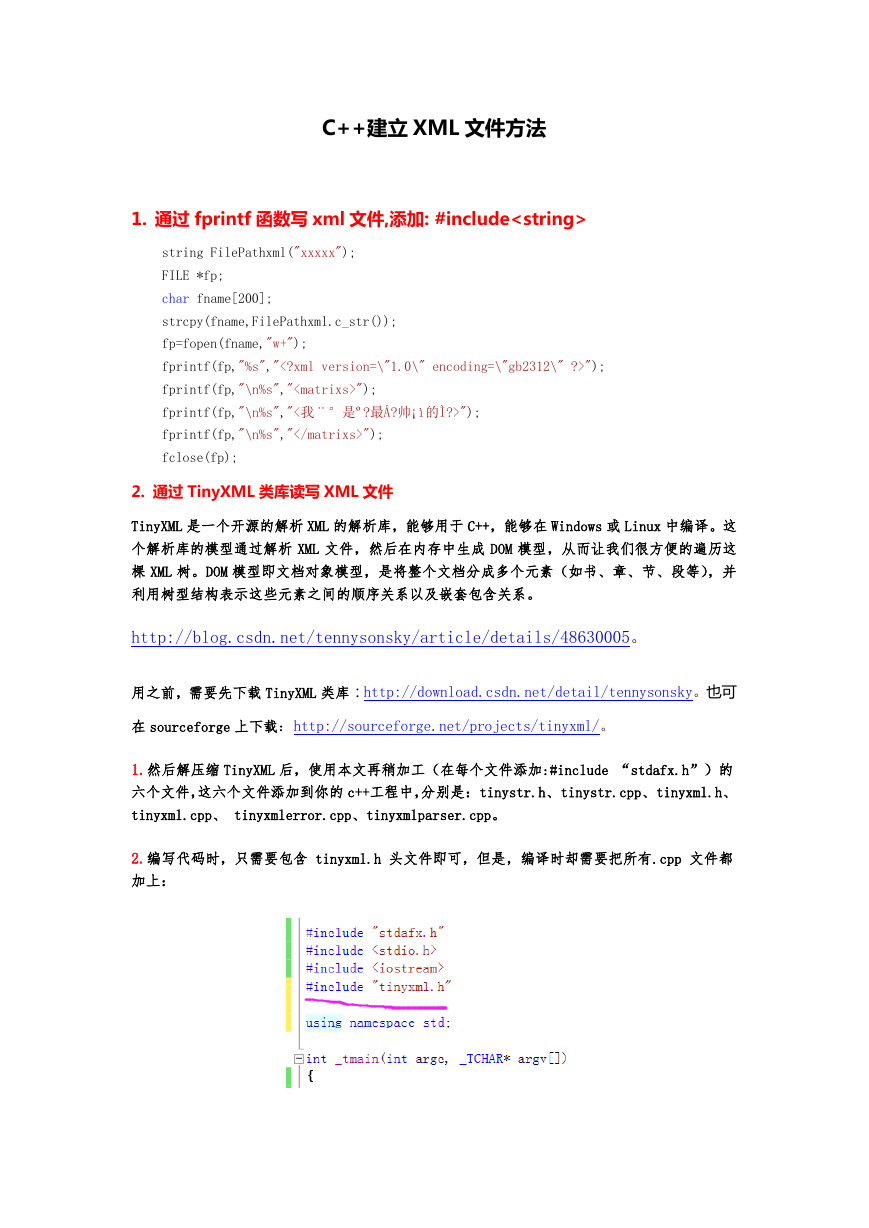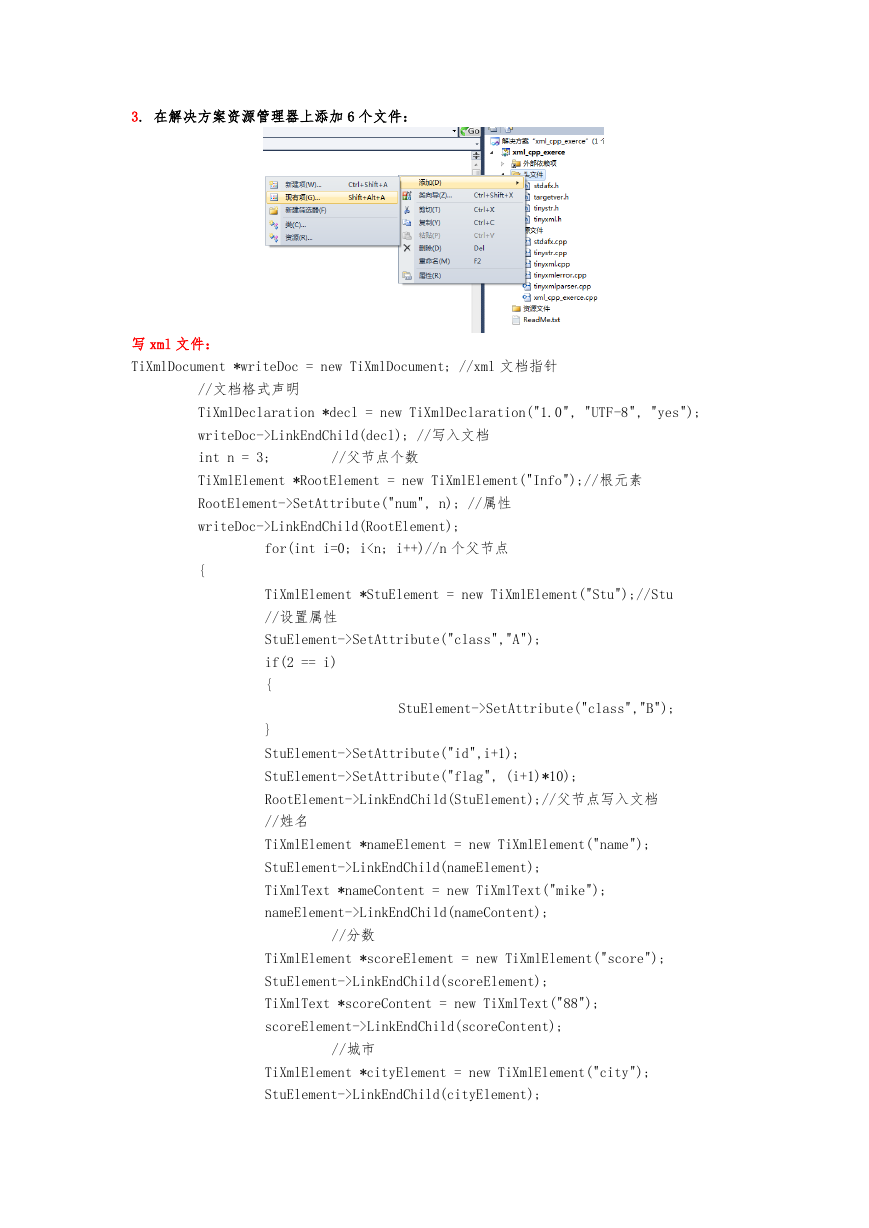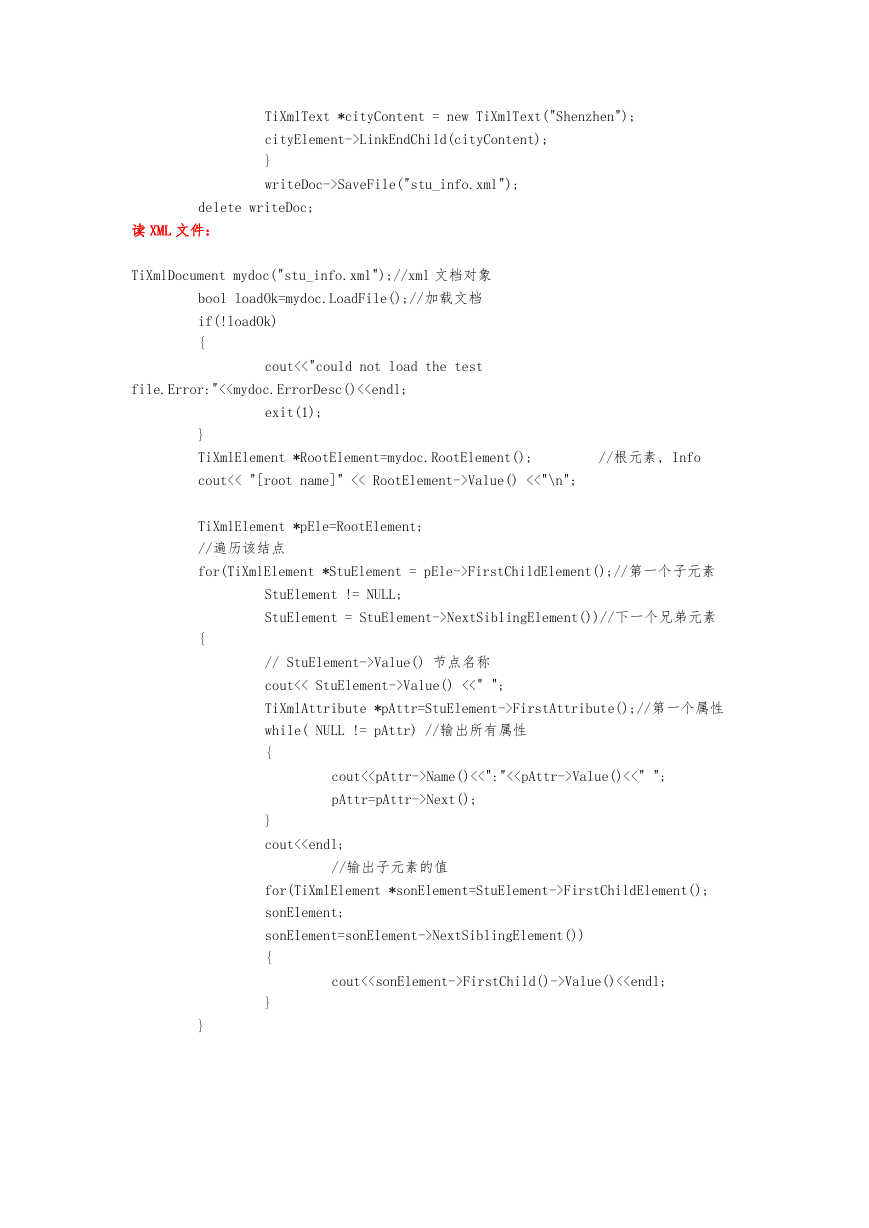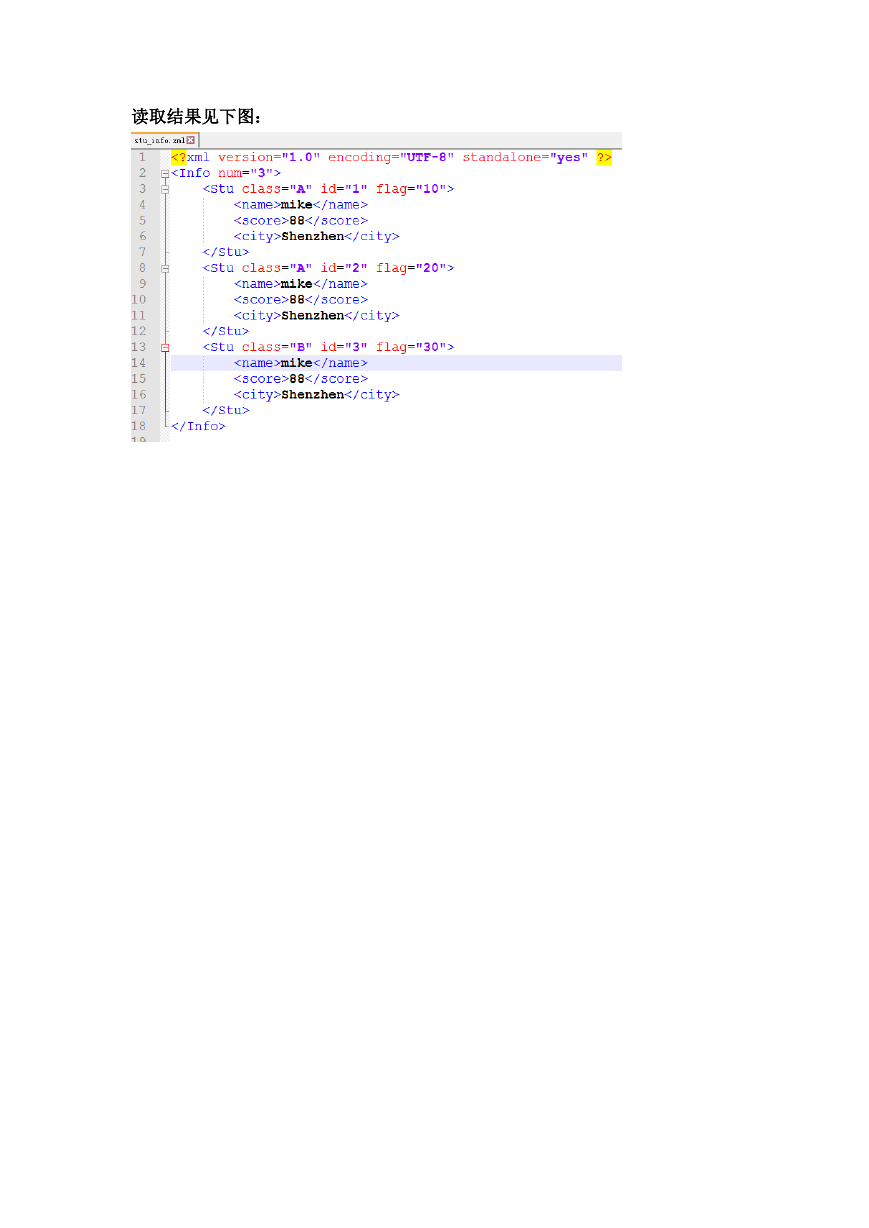C++建立 XML 文件方法
1. 通过 fprintf 函数写 xml 文件,添加: #include
string FilePathxml("xxxxx");
FILE *fp;
char fname[200];
strcpy(fname,FilePathxml.c_str());
fp=fopen(fname,"w+");
fprintf(fp,"%s","");
fprintf(fp,"\n%s","");
fprintf(fp,"\n%s","<我¨°是º?最Á?帅¡ì的Ì?>");
fprintf(fp,"\n%s","");
fclose(fp);
2. 通过 TinyXML 类库读写 XML 文件
TinyXML 是一个开源的解析 XML 的解析库,能够用于 C++,能够在 Windows 或 Linux 中编译。这
个解析库的模型通过解析 XML 文件,然后在内存中生成 DOM 模型,从而让我们很方便的遍历这
棵 XML 树。DOM 模型即文档对象模型,是将整个文档分成多个元素(如书、章、节、段等),并
利用树型结构表示这些元素之间的顺序关系以及嵌套包含关系。
http://blog.csdn.net/tennysonsky/article/details/48630005。
用之前,需要先下载 TinyXML 类库:http://download.csdn.net/detail/tennysonsky。也可
在 sourceforge 上下载:http://sourceforge.net/projects/tinyxml/。
1.然后解压缩 TinyXML 后,使用本文再稍加工(在每个文件添加:#include “stdafx.h”)的
六个文件,这六个文件添加到你的 c++工程中,分别是: tinystr.h、 tinystr.cpp、 tinyxml.h、
tinyxml.cpp、 tinyxmlerror.cpp、tinyxmlparser.cpp。
2.编写代码时,只需要包含 tinyxml.h 头文件即可,但是,编译时却需要把所有.cpp 文件都
加上:
�
3. 在解决方案资源管理器上添加 6 个文件:
写 xml 文件:
TiXmlDocument *writeDoc = new TiXmlDocument; //xml 文档指针
//文档格式声明
TiXmlDeclaration *decl = new TiXmlDeclaration("1.0", "UTF-8", "yes");
writeDoc->LinkEndChild(decl); //写入文档
int n = 3;
//父节点个数
TiXmlElement *RootElement = new TiXmlElement("Info");//根元素
RootElement->SetAttribute("num", n); //属性
writeDoc->LinkEndChild(RootElement);
{
for(int i=0; iSetAttribute("class","A");
if(2 == i)
{
}
StuElement->SetAttribute("class","B");
StuElement->SetAttribute("id",i+1);
StuElement->SetAttribute("flag", (i+1)*10);
RootElement->LinkEndChild(StuElement);//父节点写入文档
//姓名
TiXmlElement *nameElement = new TiXmlElement("name");
StuElement->LinkEndChild(nameElement);
TiXmlText *nameContent = new TiXmlText("mike");
nameElement->LinkEndChild(nameContent);
//分数
TiXmlElement *scoreElement = new TiXmlElement("score");
StuElement->LinkEndChild(scoreElement);
TiXmlText *scoreContent = new TiXmlText("88");
scoreElement->LinkEndChild(scoreContent);
//城市
TiXmlElement *cityElement = new TiXmlElement("city");
StuElement->LinkEndChild(cityElement);
�
TiXmlText *cityContent = new TiXmlText("Shenzhen");
cityElement->LinkEndChild(cityContent);
}
writeDoc->SaveFile("stu_info.xml");
delete writeDoc;
读 XML 文件:
TiXmlDocument mydoc("stu_info.xml");//xml 文档对象
bool loadOk=mydoc.LoadFile();//加载文档
if(!loadOk)
{
cout<<"could not load the test
file.Error:"<
Value() <<"\n";
TiXmlElement *pEle=RootElement;
//遍历该结点
for(TiXmlElement *StuElement = pEle->FirstChildElement();//第一个子元素
StuElement != NULL;
StuElement = StuElement->NextSiblingElement())//下一个兄弟元素
// StuElement->Value() 节点名称
cout<< StuElement->Value() <<" ";
TiXmlAttribute *pAttr=StuElement->FirstAttribute();//第一个属性
while( NULL != pAttr) //输出所有属性
{
}
cout<Name()<<":"<Value()<<" ";
pAttr=pAttr->Next();
cout<FirstChildElement();
sonElement;
sonElement=sonElement->NextSiblingElement())
{
}
cout<FirstChild()->Value()<读取结果见下图:
�








 2023年江西萍乡中考道德与法治真题及答案.doc
2023年江西萍乡中考道德与法治真题及答案.doc 2012年重庆南川中考生物真题及答案.doc
2012年重庆南川中考生物真题及答案.doc 2013年江西师范大学地理学综合及文艺理论基础考研真题.doc
2013年江西师范大学地理学综合及文艺理论基础考研真题.doc 2020年四川甘孜小升初语文真题及答案I卷.doc
2020年四川甘孜小升初语文真题及答案I卷.doc 2020年注册岩土工程师专业基础考试真题及答案.doc
2020年注册岩土工程师专业基础考试真题及答案.doc 2023-2024学年福建省厦门市九年级上学期数学月考试题及答案.doc
2023-2024学年福建省厦门市九年级上学期数学月考试题及答案.doc 2021-2022学年辽宁省沈阳市大东区九年级上学期语文期末试题及答案.doc
2021-2022学年辽宁省沈阳市大东区九年级上学期语文期末试题及答案.doc 2022-2023学年北京东城区初三第一学期物理期末试卷及答案.doc
2022-2023学年北京东城区初三第一学期物理期末试卷及答案.doc 2018上半年江西教师资格初中地理学科知识与教学能力真题及答案.doc
2018上半年江西教师资格初中地理学科知识与教学能力真题及答案.doc 2012年河北国家公务员申论考试真题及答案-省级.doc
2012年河北国家公务员申论考试真题及答案-省级.doc 2020-2021学年江苏省扬州市江都区邵樊片九年级上学期数学第一次质量检测试题及答案.doc
2020-2021学年江苏省扬州市江都区邵樊片九年级上学期数学第一次质量检测试题及答案.doc 2022下半年黑龙江教师资格证中学综合素质真题及答案.doc
2022下半年黑龙江教师资格证中学综合素质真题及答案.doc